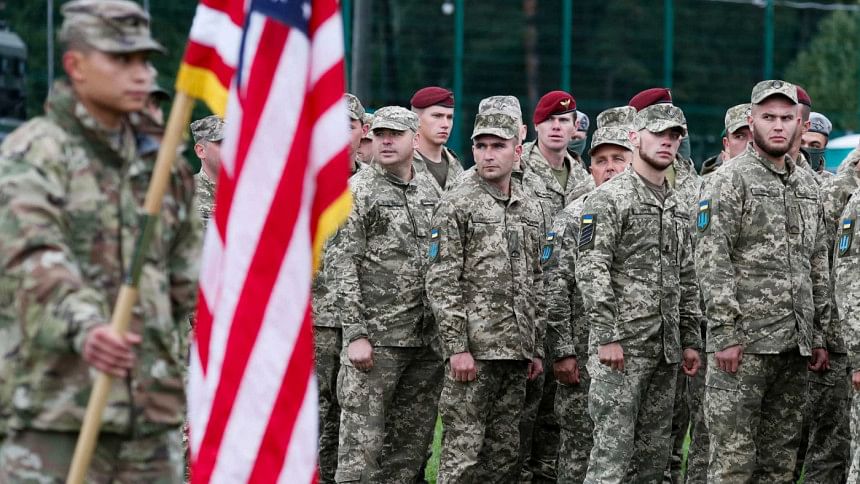Does the world really have the West’s back on Ukraine?

The war in Ukraine has spawned a mindless Russophobic war hysteria in the West that is appalling. It reminds me of my days in the US during the Iraq war. As Yogi Berra said, "It's déjà vu all over again."
The fierce moral posturing. The uncompromising Manichean worldview where the West is the knight in shining armour, and Russian President Vladimir Putin is evil incarnate. Just like Iraq's Saddam Hussain, Yugoslavia's Slobodan Milosevic or Syria's Bashar al-Assad, or whoever America's bogeyman du jour is.
This is a battle for a rules-based world order, we are told by the US and its supine western European allies, and if you're not with us, you're against us.
The bit about rules-based order will surely be news for the Palestinians, who are still waiting for their state for over half a century as Israel's continuous illegal land grabbing includes most recently the annexation of East Jerusalem. We barely heard a peep when Israeli armed thugs attacked worshippers in Al-Aqsa mosque during Ramadan.
The US media is going to town with the fact that an overwhelming majority of the UN general assembly has condemned the Russian attack. The entire world is against Russia, and Putin is now an international pariah, we are told.
Not so fast.
Indeed, the vote overwhelmingly was in support for the West, but you can dissemble with numbers. While numerically impressive, it's a hollow claim.
India and China refused to play ball. Even the usual US chums, like the UAE and Saudi Arabia, have baulked.
Except for a handful of US allies, it is remarkable how pretty much most of Asia, Africa and Latin America don't buy the West's fevered moral crusade against Russia.
Now let me be clear. Russia's attack on Ukraine was grievously wrong—just as the US attack on Iraq was. That is why few countries have actually backed Russia's attack.
Most of the world outside the US and its Western allies, however, abstained because they reject the moral posturing of the West.
The US would do well to get off its moral high horse and try to recognise why.
It must realise that its efforts to paint Russia as the biggest evil this side of hell does not cut much ice. No matter how many times the likes of EU president Ursula von der Leen, British Prime Minister Boris Johnson and top US officials make a beeline to New Delhi, for instance, India is not going to jeopardise its deep strategic and economic ties with Russia.
These bilateral ties have a long history that transcends ideology. The Soviet Union stood by India in 1971 when Pakistan refused to hand power to the democratically elected Awami League and the Pakistan army unleashed a genocide, while Richard Nixon's US administration backed Pakistan. So much for the US being champions of democracy.
You'll have a hard time telling South Africa how bad Russia is. Veteran leaders of the ruling African National Congress have fond memories of the vital support from the Soviet Union in their battle against apartheid. Meanwhile, the West dragged its feet to impose sanctions and US intelligence was in cahoots with the apartheid government, backing leaders like Jonas Savimbi and Renamo guerrillas to thwart anti-colonial battles in Angola and Mozambique.
There is much talk about Russia's war being a threat to a rules-based order. The US has waged war in Iraq, Yugoslavia and Afghanistan—all without UN sanction. The West is making furious demands to punish Russia for alleged war crimes at the International Criminal Court, but it is led by the US, which does not recognise its jurisdiction. In fact, the US revoked ICC prosecutor Fatou Bensouda's visa, widely thought to have been in response to her request to investigate possible crimes committed by US forces in Afghanistan.
The US demands that the entire world accept punitive sanctions against Russia. Yet these are not UN sanctions—the West just declared punitive sanctions by fiat without consulting the rest of the world and expects everybody else to fall in line. As Indian External Affairs Minister Jayashankar Subramanyam curtly noted when asked about cutting fuel imports, "How is it that west European countries get a free pass?"
All of this, I am afraid, reeks of a bygone imperial colonial mindset. Isn't it remarkable how you can almost tell who backs the US-led crusade against Russia by skin colour? Most white folks are gung-ho on Ukraine. Nations with people of colour? Not so much.
The US and its European allies are also making ominous noises about China. But if the Ukraine invasion is any guide, the West has its work cut out if it wants to get the rest of the world to agree.
When asked about whether China was a threat, Malaysian statesman Mahathir Mohamed said in 2018, "We have traded with China for nearly two thousand years…But China never conquered us. We have relations with Europe. The Portuguese came to Malaysia in 1509. Two years later, they came and conquered us. So I always feel that I'm safer with China than with Europe."
The West is haranguing us. Better get on the bandwagon, this is about protecting the Western civilisation—the civilisation which gave us two world wars, Hiroshima and Nagasaki, and decades-long mass slaughtering in Vietnam, Guantanamo and Abu Ghraib? Mahatma Gandhi's pithy retort, when asked about what he thought about the Western civilisation, is still as valid today as it was over half a century ago: "It would be a great idea."
Ashfaque Swapan is a writer and editor based in Atlanta, US.

 For all latest news, follow The Daily Star's Google News channel.
For all latest news, follow The Daily Star's Google News channel. 



Comments